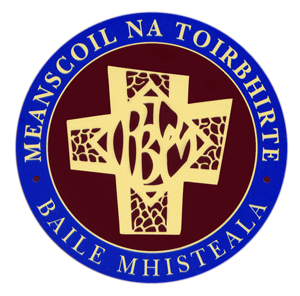
A new junior cycle
The New Junior Cycle is being introduced across all schools on a phased basis. It will feature newly developed subjects and short courses, a focus on literacy, numeracy and key skills, and new approaches of assessment and reporting. For further details and latest updates use the link below.
First Year - ALL STUDENTS TAKE THE FOLLOWING SUBJECTS:
( ✓ denotes an examination subject)
Second and Third Year - Students have six core subjects:
( ✓ denotes an examination subject)
Students then choose three of the following subjects:
( ✓ denotes an examination subject)
Also provided, are:
Note: Provision is made for students who may not be able to take the full range of subjects. A reduced timetable can be made available with learning support provided during the necessary times.
Wellbeing
Through the Wellbeing programme students will be learning the knowledge, attitudes and skills to enable them to protect and promote their own wellbeing and that of others. The junior cycle Wellbeing programme will begin in 2017 with 300 hours of timetabled learning in Wellbeing over the three years of junior cycle. This will build up to 400 hours by 2020 as the new junior cycle is implemented in schools. • The four main pillars of the junior cycle Wellbeing programme are Civic, Social and Political Education (CSPE), Physical Education (PE), Social, Personal and Health Education (SPHE) and guidance education. • Other subjects, short courses and units of learning can also contribute to a school’s Wellbeing programme. Schools can be flexible when planning their Wellbeing programme. Students, parents and teachers all have a part to play in planning a programme that suits the needs of the students in their school.
All the day-to-day interactions that take place in school can impact on students’ wellbeing. Therefore everyone can play a part in supporting wellbeing. Students have a right to feel cared for in schools. Developing good relationships in the classroom and throughout the school are essential for students’ wellbeing and for effective teaching and learning. When students feel included, respected and listened to, they are more ready to learn and more successful in their learning. Wellbeing matters not only because it leads to students doing better at school but it can also influence young people’s outcomes as adults.

































